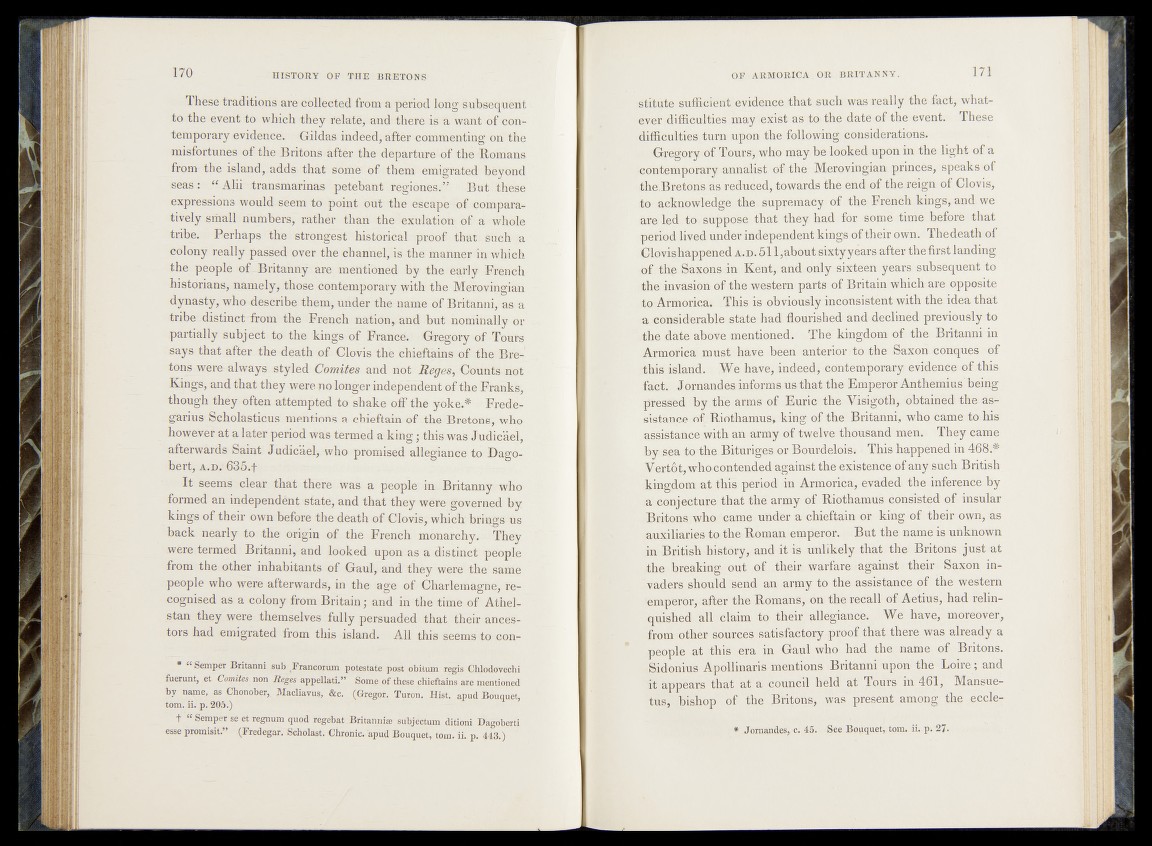
These traditions are collected’from a period long subsequent
to the event to which they felate, and there-is a-want of contemporary
evidence» Gildas indeed, after commenting on the
misfortunes of the Britons after the departure of. the ’Romans
from-the island, adds that some o f,them emigrated'' hiyond
•seas : “ Alii transmarinas petebant regiones/'" But .these
expressions wouhLseem to point out the escape of comparatively
small numbers, rather than the-iexulation- of a whole
tribe» 4; Perhaps the strongest^ historical proof that bach a
colony really :pa^dtt>ver the cbannei,ba the manner in which
the people of;_Britanny are mentioned, by the esdly French
historians, namely, those contemporary, with the. Merovingian
dynasty, who describe them,-under the-name of Britanni, as-a
tribe distinct-from the French nation, and but nominally or
partially subject to the kings- of France» Gregory of Tours
i'jSays thai?af|er the death of Clovis; the chieftains ofillheBre-!
tons were- always styled Comites and not lieges, Counts not
Kings, and that they were no longer independent of the Franks,
though they often attempted to shake off the yoke.* Fred|r
garius Scholasticus mentions a chieftain of the Bretoosr, who
however at a later period was termed a-king • this was Judicael,
afterwards Saint J udmaeb who promised allegiance to Hago-
bert, a .d .! 6 3 5 .f
It seems, clear that, there was a people in Britanny who
formed an independent state, and that they were Joverned by
kings of their own before the death of Clovis, which'briqgs us
back nearly to the origin of the French monarchy. They
were termed Britanni, and looked upon, as a distinct people
from the other inhabitants of Gaul, and they were the same
people who were afterwards, in the age of Charlemagne« ter
cognised as a colony from Britain; and in the time of'Athel-
stan they were themselves fully persuaded that their ancestors
had emigrated from this -island. All this seems to con-
* “ Semper Britanni sub ^Francorum potestate post obitum regis Chlodovechi
fuerunt, et Comtes- non Reges appellati.” Somp of thpee chieftains are mentioned
by^UMae, as (Aonober^ Macliavus, &c.' (Gregor. Turon. Hist, apud Bouquet,
tom. iil.p.
+ “ Semper se et regnum quod regebat.;Britannias subjectum ditioni Hagoberti
esse promisit.” (Fredegar. Scholast. Chronic. apud Bouquet, tom. ii. p. 443.) *
stifute Sufficient:eviden.ce.'that such was really the fact, whatever
diffic^ti-ps , may' ekist as to the date of the event. These
difficulties turn upon t>hg|ffllowing,«considerations.
^i’fGre'goryp£ffj)urs:/jwho may be looked upon in the light of a
contemporary annalist ofithp.,Merovingian princes, speaks of
the,Bretons a&r-educed, towards fees end. of the. reign of Clovis,
t©; acknowledge; 4he* supremacy* of the French kings, and we
are'-led. to/sup^ol.e that they had hbf some time; before that
lived under independent kings<o£ their own»# Thedeath of
CliPvishappened 1,about,sixty years after the first landing
,-ofe t‘Kp Saxonsdn Kent, and only? sixteen-years, subsequent to
thejinvasioh ofthd,western parts pfiBritain which are opposite
lo-Armorica; This -is obviously inconsistent with the idea that
a considerable state-had flourished anddeclined- previously to
^Ihe date abovetCentioned; The kingdom! of the Britanni in
Armorica-, ptust have /been anterior rio -the Saxon conques of
this island. ,We havp||ndee#'-contemporary evidence of this
fact. Jornandes. informs^ that the Emperor Anthemius' being
pressed by.the armsbfe Euric the Visigoth^fobtain&ch the as-
.'M&tance^f Riothamus, kings of the Britanni, who came to.his
jassisita^l# with an army of twelvedhousand men. They came
bpifea-to the Biturigpsk>r Bourdeloisi This happened in 468.*
Vertbt, who eontended against the existence of;any,sneh British^
kingdom at this period; in Armorica, evaded-; the inference by
ja conjecture that the army of Riothamus consisted of insular
Britons who came under a chieftain or king of their own, as
auxiliaries to the Roman emperqr.. But the name is unknown
in British history, and it is unlikely that the Britons, just at
the breaking out of their warfare-against their Saxon invaders
should send an army to the^ assistance of the western
‘emperor, after the Romans, on the recall of Aetius, had relinquished
all claim to their allegiance.. We have, moreover,
from other sources satisfactory proof that there was already a
people at this era in Gaul who had the name, of Britons.
Sidonius Apollinaris mentions Britanni upon the Loire; and
it appears that at a-citmncil held at Tours in 461, Mansue-
tus, bishop! 'of the Britons, was present among the eccle-
* Joraa»des, c. 45. See Boyqaet, 2?*